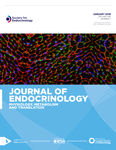A vital region for human glycoprotein hormone trafficking revealed by an LHB mutation
- Iulia Potorac1,*,
- Adolfo Rivero-Müller2,3,4,*,
- Ashutosh Trehan2,*,
- Michał Kiełbus4,
- Krzysztof Jozwiak5,
- Francois Pralong6,
- Aicha Hafidi7,
- Albert Thiry8,
- Jean-Jacques Ménagé9,
- Ilpo Huhtaniemi2,10,
- Albert Beckers1⇑ and
- Adrian F Daly1
- 1Department of Endocrinology, Centre Hospitalier Universitaire de Liège, Université de Liège, Domaine Universitaire du Sart-Tilman, Liège, Belgium
- 2Department of Physiology, Institute of Biomedicine, University of Turku, Turku, Finland
- 3Faculty of Natural Sciences and Technology, Åbo Akademi University, Turku, Finland
- 4Department of Biochemistry and Molecular Biology, Medical University of Lublin, Lublin, Poland
- 5Laboratory of Medicinal Chemistry and Neuroengineering, Medical University of Lublin, Lublin, Poland
- 6Service of Endocrinology, Diabetology and Metabolism, Department of Medicine, CHU Vaudois, Lausanne, Switzerland
- 7Department of Diabetology and Metabolic Diseases, Centre Hospitalier Universitaire Ibn Sina, Rabat, Morocco
- 8Department of Pathology, Centre Hospitalier Universitaire de Liège, Université de Liège, Domaine Universitaire du Sart-Tilman, Liège, Belgium
- 9Endocrinology Practice, Fontainebleau, France
- 10Department of Surgery and Cancer, Institute of Reproductive and Developmental Biology, Hammersmith Campus, Imperial College London, London, UK
- Correspondence should be addressed to A Beckers; Email: albert.beckers{at}chu.ulg.ac.be
Abstract
Glycoprotein hormones are complex hormonally active macromolecules. Luteinizing hormone (LH) is essential for the postnatal development and maturation of the male gonad. Inactivating Luteinizing hormone beta (LHB) gene mutations are exceptionally rare and lead to hypogonadism that is particularly severe in males. We describe a family with selective LH deficiency and hypogonadism in two brothers. DNA sequencing of LHB was performed and the effects of genetic variants on hormone function and secretion were characterized by mutagenesis studies, confocal microscopy and functional assays. A 20-year-old male from a consanguineous family had pubertal delay, hypogonadism and undetectable LH. A homozygous c.118_120del (p.Lys40del) mutation was identified in the patient and his brother, who subsequently had the same phenotype. Treatment with hCG led to pubertal development, increased circulating testosterone and spermatogenesis. Experiments in HeLa cells revealed that the mutant LH is retained intracellularly and showed diffuse cytoplasmic distribution. The mutated LHB heterodimerizes with the common alpha-subunit and can activate its receptor. Deletion of flanking glutamic acid residues at positions 39 and 41 impair LH to a similar extent as deletion of Lys40. This region is functionally important across all heterodimeric glycoprotein hormones, because deletion of the corresponding residues in hCG, follicle-stimulating hormone and thyroid-stimulating hormone beta-subunits also led to intracellular hormone retention. This novel LHB mutation results in hypogonadism due to intracellular sequestration of the hormone and reveals a discrete region in the protein that is crucial for normal secretion of all human glycoprotein hormones.
- Received 9 September 2016
- Accepted 21 September 2016
- Made available online as an Accepted Preprint 21 September 2016
- © 2016 Society for Endocrinology











